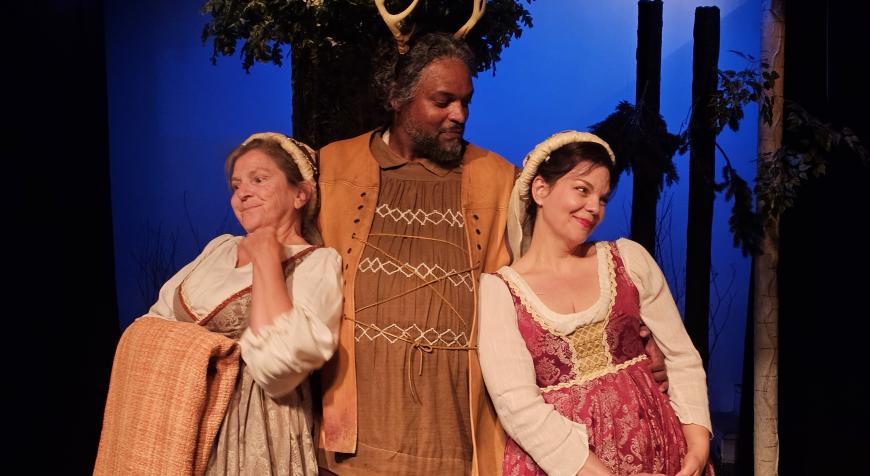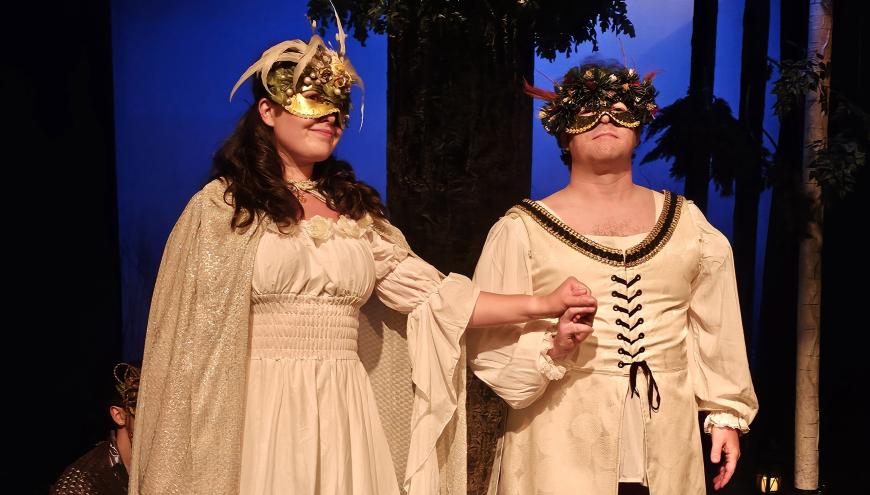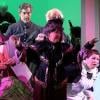
True to its name, Pocket Opera packed a lot into a small space with its opening performance of Otto Nicolai’s 1849 singspiel The Merry Wives of Windsor at the Hillside Club in Berkeley on Sunday afternoon, June 16.
Performed in Pocket Opera founder Donald Pippin’s adroitly singable (and speakable) English version of Salomon Hermann Mosenthal’s German libretto, stage director Phil Lowery’s three-hour staging featured a cast of 13 spilling around and sometimes off a compact stage. An 11-member chamber orchestra, under Robby Stafford’s direction, performed the tuneful score tucked into a narrow space beside the audience. The excellent costumes (by coordinator Lance Müller) added splashes of Elizabethan-era color and some genuine enchantment in the fairy-filled tormenting of Falstaff scene.
Fitting all the elements into a satisfying whole proved more problematic. The singing was highly variable and not always well calibrated to the house. The acting, with one notable exception, tended toward mannered overstatement or (in the pivotal role of Falstaff) comic inertia. Vocal-instrumental balance, given the orchestra’s unavoidably compromised relation to the stage, was hard to control.

Based on Shakespeare’s play of the same name, along with some borrowings from A Midsummer Night’s Dream, Merry Wives spins out the familiar misadventures of a lecherous knight (here, the physically imposing bass Kenneth Kellogg) who sets out to seduce two married women friends. Rena Harms and Marcelle Dronkers, both sopranos, played Mrs. Alice Ford and Mrs. Meg Page, respectively, a pair of bored Windsor housewives bent on teaching their would-be seducer (and one pathologically jealous husband) a lesson.
In the leading roles of Falstaff and Mrs. Ford, the singers missed the mark in different ways. Kellogg brought a handsomely sonorous voice and little else to his portrayal of the lusty knight. Burdened with a boxy fat suit, he moved awkwardly, with perfunctory gestures, and lacked the boisterous, self-parodying appetite the role invites. Only in the tavern scene, where he lolled in boozy contentment, did he take on a slyly calculating quality, his voice warmly blurred.
Harms, by contrast, poured things on too heavily. Her glittering soprano frequently shone too brightly, like the high beams of an oncoming driver. Neither her singing nor her hammy acting were productively scaled for the size of the house. Dronkers sang gamely but with an underpowered voice.

Several other cast members had their moments. Abigail Bush and Michael Desnoyers both sang prettily and with purpose, if not great range or polished technique, as the young lovers who borrow a page from the adults and do some outwitting of their own. Steve Kahn’s Mr. Page was at his best, in both literal and vocal disguise, in the closing scene that finally humbles Falstaff. Some of the most gratifying singing overall came in the opera’s numerous well-wrought ensembles.
Best-in-show honors belonged to Jonathan Spencer as the baffled, kick-me Mr. Ford, whose blustery bumbling became a blueprint for how to be cuckolded. With the demeanor and comic canniness of Nathan Lane, Spencer remained tightly, delightfully wired for his character’s own undoing. When the scales finally fell from his panic-stricken eyes, his voice and manner came purringly alive.
Some strong intonation problems aside, the orchestra played commendably. The score’s echoes of Felix Mendelssohn’s incidental music for A Midsummer Night’s Dream seemed entirely apt for a piece that references that other Shakespeare comedy in its last act.
Two performances of Pocket Opera’s Merry Wives remain — June 23 at the Mountain View Center for the Performing Arts and June 30 at the Legion of Honor in San Francisco. Both those venues should prove more hospitable, theatrically, musically and acoustically, to a worthy work. Chances to see and hear this piece come few and far between.



